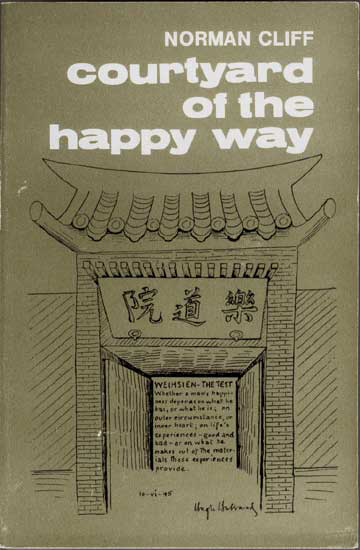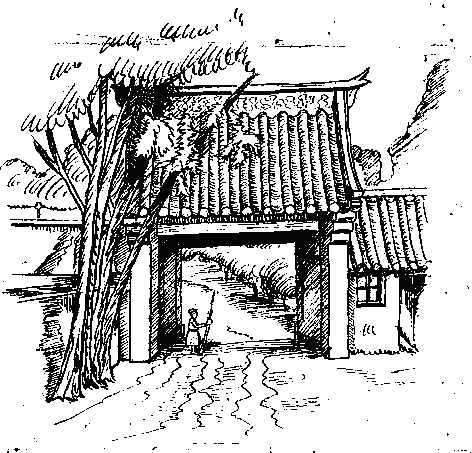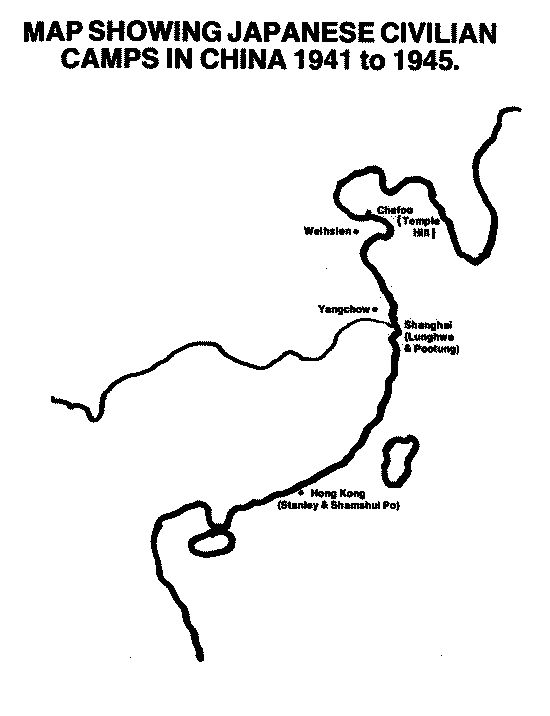
- by Norman Cliff
[Excerpts] ...
[...]
 At strategic points throughout the camp
were cesspools into which the latrines ran and dirty buckets of water were emptied.
At strategic points throughout the camp
were cesspools into which the latrines ran and dirty buckets of water were emptied.
Playing near the cesspool by the bakery with his sister, Johnny Kelly fell head first into its dirty waters, and Mary let out wild shrieks to attract urgent assistance for her unfortunate brother.
Johnny went up and down four times in the filthy pool to be rescued timeously by a burly British seaman who skilfully applied artificial respiration. The lad recovered from the accident, but for the remainder of the duration was dubbed “Cesspool Kelly”.
[excerpt]
Adjutant Buist was a handsome and outgoing Welshman.
In his little camp room (which he shared with his wife and small children) he patiently gave me lessons.
After several weeks of training and practice I joined the band practice every Tuesday evening as second trombonist.
The Salvation Army had been treated with suspicion by the Japanese since their arrival in China. They disliked its military associations’ uniform, officers and military terminology.
The movement had consequently been forced to change its Chinese name from “Save the World Army” to “Save the World Church”.
Present at our band practices in a small room next to the boot repair shop were ten Salvationists with four or five Christians from other denominations. We spent many happy hours learning Salvationist marches and hymns. To play the great hymns of the Church with brass instruments in such harmony and rhythm was an indescribable experience.
One of the officers had composed a medley of all the Allied national anthems. But when we practised it all the parts were played except the air, and so the tunes were not recognised by the authorities. Convinced that camp life would one day come to an abrupt end, whether by Russian, American, British or Chinese intervention, we were determined to have a suitable piece of music to play for the great occasion, whenever it was or however it was to happen. We practised it month after month, and the very process of playing the Victory March kindled in our hearts faith and optimism.
On Sunday afternoons we would gather on the grounds outside the hospital, and under the baton of Brigadier Stranks play:

“Be still, my soul, the Lord is on thy side;
Bear patiently thy cross of grief or pain.
Leave to thy God to order and provide;
In every change He faithful will remain.”
 #
#

[excerpt]
Getting my trombone from Block 23, I rushed back to the gate. The band was standing on a mound behind the electrified wires at the rear of the church in a position which commanded a good view of the triumphal entry of the seven American parachutists. The baton of Brigadier Stranks gave the signal, and we were away.
But my eyes strayed from the music to the drama going on outside the gate. The parachutists were being carried shoulder high towards the entrance by excited internees. My right hand went through motions of playing the trombone as I watched the developments in front of me. In the group of Americans was Jimmy Moore who had been a prefect at the Chefoo Schools when I was in the Second Form. He had evidently pulled strings to be in this particular relief mission.
Steven, the first trombonist beside me, a tall American lad, stopped playing and collapsed, sobbing like a baby. I was later told that hospital patients, suffering from all kinds of ailments, had jumped out of their ward windows to witness the morning’s spectacle, and never returned to their sick beds, mysteriously healed of their various physical complaints.
 #
#
[further reading] ...
http://www.weihsien-paintings.org/NormanCliff/Books/Courtyard/eDocPrintPro-BOOK-Courtyard-01-WEB-(pages).pdf
#








